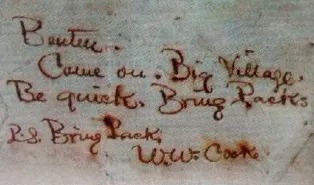J. T. Hickey represented well the people of spirit and mettle who entered this country and survived in trying conditions. His obituary hints at living an adventurous life, but I was put in contact with a member of the family who provided more information. A grandson wrote a concise biography of him which another family member forwarded to me. The father of the man who eventually settled in Sheldon knew Abraham Lincoln and introduced the young J. T. to him.
At the start of the Civil War Old John freed his slaves. He wanted to apprentice J. T. to the printing trade, but it wasn’t to his liking so he struck out for the West. He became a stage coach driver for a time and said he drove a coach between Jamestown and Deadwood.
Later on he became a supply wagon teamster for the army. At the Battle of the Little Big Horn he drove a supply wagon for a Captain Benteen who was under a Major Reno and had the immediate task to come to the aid of George Custer. Custer’s last note is a request for help and was dropped by the officer who received it. J. T. picked it up and later sent it to Custer’s widow.
The grandson wrote more saying his grandfather was called to Chicago to testify at the court martial of Major Reno for Reno’s failure to come to the aid of Custer. Reno was found guilty on six of seven charges against him, and ordered dismissed from the army. Later, President Rutherford B. Hayes reduced the dismissal sentence to two years.
I’ve looked for information regarding Hickey’s participation in the trial but have never found any. Likewise, I’ve searched for Hickey’s connection to the message found fluttering on the battleground and have not found any there either. We can just be content that this legend lives within the family and is not for me to question.
J. T.’s wife gets mention. The grandson writes “I recall Dad mentioning that his mother, who was very diminutive, carried a Colt revolver with her at all times when the men were away from the house because there were many unsavory characters prowling the countryside at that time.” She had such small feet that when a girl had to wear baby shoes. As an adult she had to have her shoes custom made in Chicago because she couldn’t find small enough ones locally.
As a lover of our local history, I found Hickey’s story fascinating. I can only wish more of it would have been written. Bits and snatches of his daily life appear in the Sheldon paper, but they just speak of simple everyday things like doctor visits, business trips, etc. Some readers of this have the Kaspari family relationship. A daughter of the Hickey’s became the wife of Martin Kaspari who I’m sure is a relation. Maybe someone can add information.
More stories will come. That’s all for now.




No comments:
Post a Comment